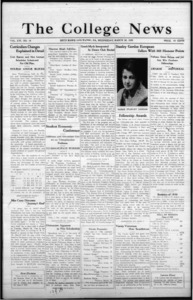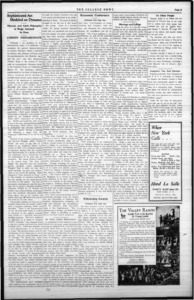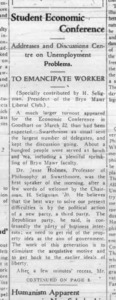Student Economic Conferece
Dublin Core
Title
Student Economic Conferece
Subject
Bryn Mawr College
Description
The "Student Economic Conference" article describes the speakers and events of the 1930 conference on the contemporary economic difficulties of the (white) worker. This conference was hosted by the Bryn Mawr Liberal Club, preceded the 1931 conference on "The Economic Status of Negroes," and saw much greater attendance.
Source
The College News, 1930-03-26, Vol.16, No.18
Publisher
Bryn Mawr College
Date
1930-02-26
Contributor
Specially contributed by H. Seligman, then-President of the Bryn Mawr Liberal Club.
Rights
Item courtesy Bryn Mawr College Special Collections
Language
English
Text Item Type Metadata
Text
Student Economic Conference
Addresses and Discussions Centre on Unemployment Problems.
TO EMANCIPATE WORKER
(Specially contributed by H. Seligman, President of the Bryn Mawr Liberal Club.)A much larger turnout appeared for the Economic Conference in Goodhart on March 22, than had been expected. Swarthmore as usual sent the largest number of delegates, and kept the discussion going. About a hundred people were served at lunch and tea, including a plentiful sprinkling of Bryn Mawr faculty.
Dr. Jesse Holmes, Professor of Philosophy at Swarthmore, was the first speaker of the morning, after a few words of welcome by the Chairman, H. Seligman, ’30. He believes that the best way to solve our present difficulties is by the political action of a new party, a third party. The Republican party, he said, is confessedly the party of business interests; we need to get rid of the property idea as the aim of government. The work of this generation is to eliminate the acquisitive motive and to get back to the earlier ideals of liberty. After a few minutes’ recess, Mr.
CONTINUED ON PAGE 3
Economic Conference
Continued from Page One
Reed Cary, Vice-President of Leeds, Northrup and Company, took the floor, and discussed the relationship between the corporation and the individual. The worst problem in unemployment, he said, lies in adjusting those men who have no ability, or who are in the wrong positions. The problem of consolidation is one that has not yet been satisfactorily worked out, for the less efficient loses out always. The new philosophy of industry is both moral and economic—to pay the highest possible wages. Unemployment, said Mr. Cary, is uneconomical as well as unjust. Many of the unemployed are men of trained brains; unemployment is hitting all classes, and may affect us. This is an evil analogous to the slavery evil.The discussion, led by Anne Burnett, Bryn Mawr, ’32, centered around the effort of Leeds, Northrup and Company to meet the problems of unemployment and insurance.
At one o’clock the conference adjourned for lunch in the May Day Room, to convene again at two. Mr. Tom Tippett of the Brookwood Labor College gave a very impassioned speech from the point of view of labor. The engineers are tools of the capitalists, and so salvation will not come from them. There must be a power strong enough to make people see what is happening and do something about it. This power exists in the labor group. No business man wants government to come into business except to put up tariffs, so we must change our government. Independent political action may do it—if not, then-revolution.
The Labor movement is much more idealistic, more Christian than any other group. Sacrifice in the American Labor Movement is as great as it is to be found anywhere. Labor Unions have many faults, but they are not all stupid and crooked. Illegal and brutal opposition is the cause of some of this.
“This conference is an indictment of our colleges, because we should be talking of these things in our classes, and not need to call a conference.” The college group is too intelligent; the idealism necessary to right the situation appeals to labor. Public schools do not teach this idealism. The need and the labor movement alone will educate people.
The discussion was led by Howard Westwood, of Swarthmore, and it continued long after Mr. Tippett's departure. Dr. Wilcox, of the University of Pennsylvania, Mr. Biemiller, and Mr. Krueger took active parts in this discussion.
After the announcement of the conference to be held at Johns Hopkins over the 29th of March, and after a brief summary of the day by V. Butterworth, Bryn Mawr, ’32, and the conference adjourned to tea, and finally ended at 5.30.
Files
Reference
1930, Student Economic Conferece, Bryn Mawr College




